2025 “Dickinson and Ecologies” International Conference: A Model of Interdisciplinary Academic Collaboration
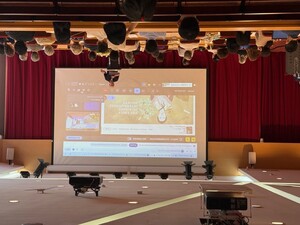
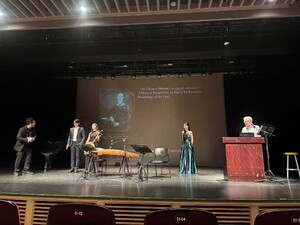
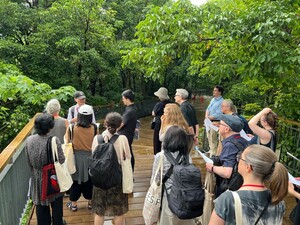
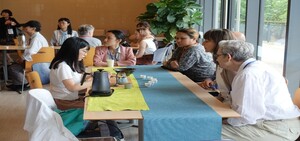
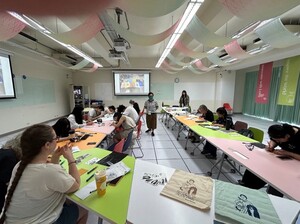
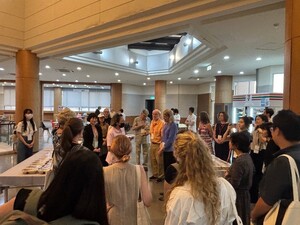
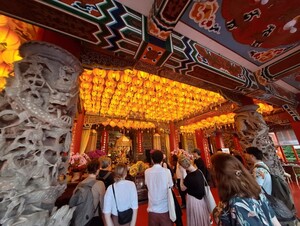
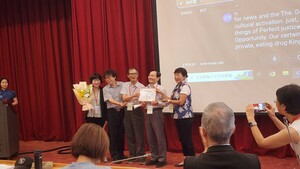
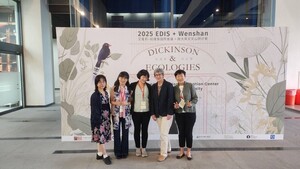
Date :
2025-08-07
Department :
Department of English
【Department of English】
The Department of English at the College of Foreign Languages and Literature, National Chengchi University (NCCU) collaborated with the Emily Dickinson International Society (EDIS) and successfully hosted the 2025 “Dickinson and Ecologies” EDIS*Wenshan International Conference, both online and on-site from June 19 to 22 at the Research Innovation-Incubation Center. The four-day event brought together a diverse group of scholars from around the world to present their research and engage in meaningful academic exchange. Attracting submissions and participation from over a hundred scholars and educators across more than ten countries spanning five continents, the total number of in-person and online participants from both domestic and international locations approaches 300. The overall scale and content of the event reflect a high level of international engagement and diversity.
Since the Emily Dickinson International Society began organizing conferences in 1992, this international conference marks only the second time it has been held in Asia, following the 2007 event co-hosted with the Japan Chapter at Kobe University. In both scope and format, it breaks away from the longstanding pattern of primarily being held in Europe and North America. Centered on the work of the nineteenth-century American poet Emily Dickinson, the conference explored themes spanning literature, ecology, culture, and history. The program featured two major plenary roundtable forums, multiple paper presentation sessions on a wide range of themes, as well as a vibrant lineup of artistic exhibitions and interactive workshops. Highlights included visual art exhibitions by Canadian, American, Chinese, and Taiwanese artists; book displays; a tea culture exhibit by NCCU English students; two botanical campus tours; a music performance by a New York-based composer, alongside traditional Chinese, Hokkien, and Hakka musicians; poetry quiz gathering; a theatrical performance by two Austrian artists; and a series of local art, music, and educational workshops. The event attracted over a hundred poets, scholars, artists, translators, educators, ecologists, and students, all gathering to celebrate poetry and scholarly dialogue. It has successfully promoted international academic exchange and enhanced the visibility of Taiwanese scholarship and culture.
Emily Dickinson, one of the most significant poets of nineteenth-century America, often express the nonhuman world in the perspective of human in her poetry, offering a profound inquiry into the interconnectedness between species and ecological systems. Her emphasis on ecological diversity resonates with the rich biodiversity found in the Wenshan District, home to NCCU. Being known for its ecological richness and the presence of the Taipei Zoo, the Wenshan District is also celebrated for its mountainous terrain and vibrant tea culture. The name “Wenshan,” which literally means “mountain of literature,” aptly reflects the conference’s focus on life-nurturing themes and affirms the district as a fitting site for an international gathering on Dickinson and ecology.
Dickinson was not only a poet but also a gardener, and her poems often probe the unstable relationship between human civilization and the nonhuman world. Her work invites reflection and re-examination of human-environment relations. Following this spirit, the 2025 “Dickinson and Ecologies” conference adopted ecocritical approaches and encouraged interdisciplinary and cross-cultural perspectives on Dickinson’s ecological poetics. The conference welcomed scholarly papers, artistic presentations, workshops, and other collaborative projects related to the theme, aiming to engage contemporary ecocritics in reflecting on how Dickinson’s poetry might help readers understand the human-nonhuman relationship in the context of present-day environmental crises. At the same time, through the expanded scale of international academic exchange brought about by the EDIS*Wenshan International Conference, National Chengchi University (NCCU) has fostered vibrant interdepartmental and intercollegiate collaboration, thereby embodying a model of interdisciplinary academic cooperation.
Through its interdisciplinary and cross-cultural format, the conference responds to contemporary societal concerns about ecological sustainability, thereby enhancing the social impact of poetic studies. At the same time, it exemplifies a model of interdisciplinary academic collaboration through the joint efforts of NCCU’s College of Foreign Languages and International College of Innovation, along with the support of various university units such as the Office of International Cooperation, Office of Research and Development, Bilingual Education Center, and the Center for Industry Collaboration and Innovation Incubation.
The conference opened with welcome remarks by NCCU President Professor Tsai-Yen Li and Acting Dean of the College of Foreign Languages and Literature Professor Chin-chi Chao. Opening speeches were also delivered by EDIS President Paraic Finnerty and NCCU English Department Chair and Conference Organizer Professor Li-hsin Hsu. The event commenced with a specially prepared video, featuring NCCU students reading Dickinson’s poetry, setting a poetic tone for the days of intellectual and artistic exploration.
The conference received an enthusiastic response to its call for papers and showcased a rich array of topics, including plant and animal studies, the Anthropocene, the Global South, conceptions of kinship, posthumanism and multispecies imaginaries, as well as ecogothic and ecophobia. These diverse contributions have provided significant momentum for further Dickinson scholarship. The two major plenary roundtable forums were chaired by esteemed scholars Professor Yaofu Lin and Professor Te-Hsing Shan, who fostered dynamic academic dialogue and opened up new interpretive horizons for all participants.
EDIS President Paraic Finnerty emphasized that the success of the conference was made possible by the enthusiastic participation of attendees, the long-standing contributions of scholars, and the generous support from the organizing teams and NCCU. Whether joining in person or online, all participants were deeply impressed by the professionalism and dedication of the student assistants led by Professor Li-hsin Hsu, which ensured the seamless execution of every session and activity. Special thanks were extended to Professor Hsu for her vision and tireless efforts in bringing EDIS to Taiwan. Her leadership and commitment culminated in an extraordinary and inspiring academic event that will be long remembered.
The Department of English at the College of Foreign Languages and Literature, National Chengchi University (NCCU) collaborated with the Emily Dickinson International Society (EDIS) and successfully hosted the 2025 “Dickinson and Ecologies” EDIS*Wenshan International Conference, both online and on-site from June 19 to 22 at the Research Innovation-Incubation Center. The four-day event brought together a diverse group of scholars from around the world to present their research and engage in meaningful academic exchange. Attracting submissions and participation from over a hundred scholars and educators across more than ten countries spanning five continents, the total number of in-person and online participants from both domestic and international locations approaches 300. The overall scale and content of the event reflect a high level of international engagement and diversity.
Since the Emily Dickinson International Society began organizing conferences in 1992, this international conference marks only the second time it has been held in Asia, following the 2007 event co-hosted with the Japan Chapter at Kobe University. In both scope and format, it breaks away from the longstanding pattern of primarily being held in Europe and North America. Centered on the work of the nineteenth-century American poet Emily Dickinson, the conference explored themes spanning literature, ecology, culture, and history. The program featured two major plenary roundtable forums, multiple paper presentation sessions on a wide range of themes, as well as a vibrant lineup of artistic exhibitions and interactive workshops. Highlights included visual art exhibitions by Canadian, American, Chinese, and Taiwanese artists; book displays; a tea culture exhibit by NCCU English students; two botanical campus tours; a music performance by a New York-based composer, alongside traditional Chinese, Hokkien, and Hakka musicians; poetry quiz gathering; a theatrical performance by two Austrian artists; and a series of local art, music, and educational workshops. The event attracted over a hundred poets, scholars, artists, translators, educators, ecologists, and students, all gathering to celebrate poetry and scholarly dialogue. It has successfully promoted international academic exchange and enhanced the visibility of Taiwanese scholarship and culture.
Emily Dickinson, one of the most significant poets of nineteenth-century America, often express the nonhuman world in the perspective of human in her poetry, offering a profound inquiry into the interconnectedness between species and ecological systems. Her emphasis on ecological diversity resonates with the rich biodiversity found in the Wenshan District, home to NCCU. Being known for its ecological richness and the presence of the Taipei Zoo, the Wenshan District is also celebrated for its mountainous terrain and vibrant tea culture. The name “Wenshan,” which literally means “mountain of literature,” aptly reflects the conference’s focus on life-nurturing themes and affirms the district as a fitting site for an international gathering on Dickinson and ecology.
Dickinson was not only a poet but also a gardener, and her poems often probe the unstable relationship between human civilization and the nonhuman world. Her work invites reflection and re-examination of human-environment relations. Following this spirit, the 2025 “Dickinson and Ecologies” conference adopted ecocritical approaches and encouraged interdisciplinary and cross-cultural perspectives on Dickinson’s ecological poetics. The conference welcomed scholarly papers, artistic presentations, workshops, and other collaborative projects related to the theme, aiming to engage contemporary ecocritics in reflecting on how Dickinson’s poetry might help readers understand the human-nonhuman relationship in the context of present-day environmental crises. At the same time, through the expanded scale of international academic exchange brought about by the EDIS*Wenshan International Conference, National Chengchi University (NCCU) has fostered vibrant interdepartmental and intercollegiate collaboration, thereby embodying a model of interdisciplinary academic cooperation.
Through its interdisciplinary and cross-cultural format, the conference responds to contemporary societal concerns about ecological sustainability, thereby enhancing the social impact of poetic studies. At the same time, it exemplifies a model of interdisciplinary academic collaboration through the joint efforts of NCCU’s College of Foreign Languages and International College of Innovation, along with the support of various university units such as the Office of International Cooperation, Office of Research and Development, Bilingual Education Center, and the Center for Industry Collaboration and Innovation Incubation.
The conference opened with welcome remarks by NCCU President Professor Tsai-Yen Li and Acting Dean of the College of Foreign Languages and Literature Professor Chin-chi Chao. Opening speeches were also delivered by EDIS President Paraic Finnerty and NCCU English Department Chair and Conference Organizer Professor Li-hsin Hsu. The event commenced with a specially prepared video, featuring NCCU students reading Dickinson’s poetry, setting a poetic tone for the days of intellectual and artistic exploration.
The conference received an enthusiastic response to its call for papers and showcased a rich array of topics, including plant and animal studies, the Anthropocene, the Global South, conceptions of kinship, posthumanism and multispecies imaginaries, as well as ecogothic and ecophobia. These diverse contributions have provided significant momentum for further Dickinson scholarship. The two major plenary roundtable forums were chaired by esteemed scholars Professor Yaofu Lin and Professor Te-Hsing Shan, who fostered dynamic academic dialogue and opened up new interpretive horizons for all participants.
EDIS President Paraic Finnerty emphasized that the success of the conference was made possible by the enthusiastic participation of attendees, the long-standing contributions of scholars, and the generous support from the organizing teams and NCCU. Whether joining in person or online, all participants were deeply impressed by the professionalism and dedication of the student assistants led by Professor Li-hsin Hsu, which ensured the seamless execution of every session and activity. Special thanks were extended to Professor Hsu for her vision and tireless efforts in bringing EDIS to Taiwan. Her leadership and commitment culminated in an extraordinary and inspiring academic event that will be long remembered.


 Fax:886-2-29379611
Fax:886-2-29379611